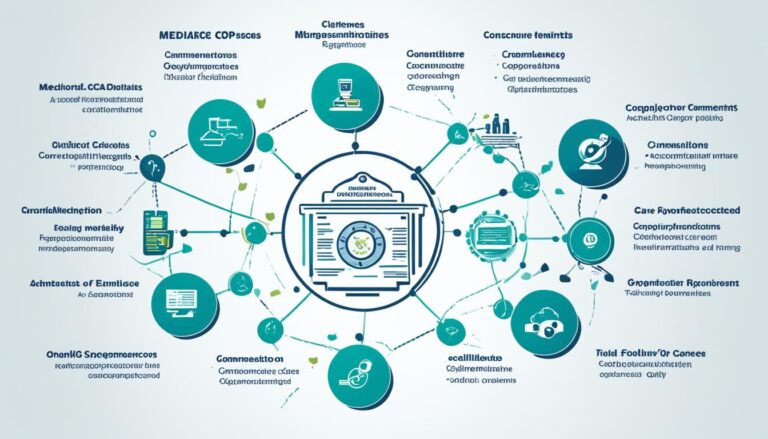HRSA Requirements: Comply with Confidence
Did you know the Health Resources and Services Administration (HRSA) manages over $10 billion yearly for health projects? For health groups, following HRSA Requirements is crucial for funding and quality care. Understanding these rules might seem tough, but it is very important. To comply with HRSA regulations, it’s not just about following rules. It’s about making best practices a core part of your work and ensuring every dollar benefits the patients.
Starting the journey to healthcare compliance can feel hard, but knowing the federal requirements for HRSA helps. This guide helps you understand HRSA’s complex rules and shows you how to meet their strict criteria. Keep reading to learn how your organization can do more than just follow rules under HRSA’s watch.
Key Takeaways
- HRSA regulates over $10 billion in healthcare funding, making compliance crucial for organizations.
- Understanding and meeting HRSA requirements is essential for ensuring eligibility for federal healthcare programs and funding.
- Healthcare compliance involves incorporating HRSA guidelines into every aspect of clinical and administrative operations.
- Successfully complying with HRSA regulations requires a strategic approach and a thorough grasp of federal healthcare mandates.
- Adherence to HRSA regulations is key to not only securing funding but also to delivering high-quality patient care.
Understanding HRSA and Its Role in Healthcare
The Health Resources and Services Administration (HRSA) is key within the U.S. healthcare system. Understanding HRSA shows us an entity aiming to improve healthcare access for the uninsured, isolated, or medically vulnerable. It handles a wide range of tasks, from training health workers to providing HIV/AIDS care and improving maternal-child health.
The role of HRSA covers many areas, focusing on improving healthcare services. Its efforts help healthcare facilities, support workforce development, and make quality care more accessible. For healthcare providers, knowing HRSA’s role is crucial for meeting federal health standards.
To see the full effect of HRSA in healthcare, consider its work in primary care and health worker training. HRSA funds health centers and supports education through loan repayments and scholarships. It also runs the National Health Service Corps, placing healthcare workers where they’re most needed.
- Improving Health Center Operations: HRSA provides funds and resources to grow community health centers.
- Enhancing Quality Care: HRSA’s rules help improve health outcomes, including maternal and infant health, mental health, and emergency responses.
- Health Workforce Training: HRSA focuses on training for healthcare workers, ensuring high-quality care.
HRSA was key during the recent pandemic, leading emergency efforts to boost service capacity. Aligning with HRSA helps healthcare groups better face public health challenges.
With HRSA-funded health centers serving 1 in 11 Americans, understanding HRSA’s wide impact is vital for any healthcare plan focusing on community health and workforce growth.
In all, HRSA’s role is essential in shaping a well-equipped, accessible, high-quality healthcare system. Healthcare organizations adhering to federal laws greatly benefit from understanding HRSA’s goals, guidelines, and programs. This enhances care for people all over the nation.
Health Resources and Services Administration (HRSA) Requirements
When seeking funds from the HRSA, healthcare organizations must understand HRSA’s rules fully. These rules cover application requirements, who can apply, how the money can be used, and general funding rules. Knowing each part helps organizations be ready to work within HRSA’s detailed system.
General Application/Eligibility Criteria
Organizations looking for HRSA financial help must meet eligibility criteria. HRSA has different requirements for each of its programs. However, some rules are the same for all. It’s vital for groups to closely look at these application criteria before applying. They need to check things like what type of organization they are, how many people they can serve, and their community’s needs.
HRSA Regulations for Funding and Support
HRSA regulations make sure money is shared fairly and used well in health service programs. Groups wanting support need to show they can use the funds right, according to HRSA’s strict rules. Sticking to funding guidelines is key for getting and keeping HRSA’s backing.
Making sure you understand HRSA regulations is key to getting and managing HRSA money. It shows the importance of careful planning and always following rules.
- Exhibit transparency in the allocation and use of HRSA funds
- Ensure the delivery of services aligns with grant objectives and HRSA expectations
- Uphold high performance and accountability standards
Navigating the HRSA Compliance Landscape
Diving into HRSA compliance needs a proactive plan to understand its multiple rules. Even though it’s complex, mastering HRSA compliance is doable. It leads to better patient care and operational success for healthcare groups.
Getting Acquainted with HRSA Compliance Guidelines
Starting the HRSA compliance journey means fully understanding the compliance guidelines. These guidelines help healthcare places follow HRSA’s rules and get the support they need for their programs. By carefully reviewing these guidelines, organizations can find a clear way to comply.
Common Compliance Challenges and Solutions
Healthcare groups often face healthcare compliance challenges that slow down meeting HRSA’s standards. Spotting these issues is the first step in creating a strong compliance plan to tackle them.
| Compliance Challenges | Proactive Solutions |
|---|---|
| Interpreting Complex Regulations | Invest in Training & Legal Advisement |
| Limited Resources for Compliance | Allocate Budget and Utilize Grants |
| Keeping Up with Regulatory Changes | Establish a Regulatory Update System |
| Maintaining Documentation and Records | Implement Electronic Health Records (EHR) |
Tackling these challenges with compliance solutions made for your organization’s needs makes HRSA compliance easier. This leads to better compliance skills and healthcare quality.
HRSA compliance isn’t just about meeting standards; it’s about creating a culture of ongoing compliance and improvement. With an informed and solution-based approach, healthcare providers can move through compliance smoothly. This turns challenges into chances for better care and growth.
HRSA Funding Guidelines and Grant Eligibility
Starting your journey to get Health Resources and Services Administration (HRSA) funding requires good prep. Know the HRSA funding guidelines and grant eligibility criteria. These rules help ensure funds go to the right places, helping to better health care for all.
First, check the HRSA grant application rules carefully. These explain what you need to get HRSA’s different funding opportunities. This includes funding for community health to research that helps improve care quality.
Every year, HRSA offers lots of chances to improve health services nationwide. Knowing the guidelines well is key to a successful grant application.
Getting HRSA funding means following several important steps. Here are some things to keep in mind:
- Your group’s goals should match HRSA’s aims.
- You need to serve the right area.
- Show you can handle the money well.
- Have clear, achievable goals for your project.
Now, let’s look at a table comparing eligible and non-eligible applicants. This is based on usual HRSA funding rules:
| Criteria | Eligible Applicants | Non-Eligible Applicants |
|---|---|---|
| Non-Profit Status | 501(c)(3) certified | Lacking non-profit certification |
| Experience in Health Services | Proven track record in health programs | No prior experience or documentation |
| Financial Management | Audited financial statements available | Unable to show financial clarity |
| Community Impact | Detailed benefit statement for the community | Unclear or not specified community benefit |
Knowing the HRSA funding guidelines well and preparing your HRSA grant application carefully matters a lot. Focusing on the details of eligibility criteria helps your organization get closer to the funding needed for crucial health services.
Key Components of the HRSA Application Process
The Health Resources and Services Administration (HRSA) funding needs a detailed step-by-step application. This includes important registration steps, like getting a DUNS number and finishing SAM registration. Also, it talks about submitting applications through Grants.gov, which is very important.
Registration Requirements: DUNS and SAM
At the start, organizations must meet some basic requirements. One key step is getting a DUNS number, which confirms a business’s real and legit status. Then, completing SAM registration is a must. It’s where businesses can officially work with the U.S. government.
Pro Tip: Ensure your DUNS number and SAM registration are both current and active before proceeding with other aspects of your HRSA application to avoid any unnecessary delays.
| Requirement | Description | Application Phase |
|---|---|---|
| DUNS Number | A unique nine-digit identification number for each physical location of your business. | Pre-Application |
| SAM Registration | Official U.S. government system that consolidates the capabilities of CCR/FedReg, ORCA, and EPLS. | Pre-Application |
The Importance of Grants.gov for HRSA Applications
After dealing with registration, Grants.gov becomes vital for HRSA applications. It’s the go-to site to find and apply for federal funds. This site makes things easier by gathering all federal grant offers and acting as the main entry for submitting HRSA grants.
To better your chance of success, make sure your contact people are registered with Grants.gov. This allows you to look for HRSA funding options and turn in full applications by the deadlines.
In summary, it’s crucial to understand and precisely follow the HRSA application steps. This includes tasks like securing a DUNS number, finishing SAM registration, and using Grants.gov well. Following these steps is key for organizations that want HRSA funding.
Please note that the specific details and sequence of the HRSA application requirements can be subject to changes; it is critical to always consult the HRSA website or contact their helpdesk for the most up-to-date guidance.
Eligibility and Program Requirements for HRSA Grants
To get HRSA grant funding for healthcare projects, understanding the rules is key. The Health Resources and Services Administration sets clear standards. Knowing these helps organizations check if they can apply. This means spotting the differences between eligible and non-eligible groups.
Understanding HRSA Grant Eligibility Criteria
HRSA’s eligibility rules make sure only the right organizations get funding. This is to boost public health. Groups need to fit specific criteria, like being a non-profit or connected to the government. Plus, they have to focus on HRSA’s health aims. It’s not just about ticking boxes. Groups must show they’re in tune with HRSA’s goals to improve health access.
Applicants have to prove they can handle the funds properly. They must outline how they will make a difference in areas like primary care or health education.
Distinguishing Between Eligible and Non-Eligible Applicants
What sets eligible groups apart from others includes structure and goals. Non-eligibles might lack proper organization or focus on different populations. They may also miss key accreditations. Knowing these differences helps avoid wasted effort.
| Eligibility Status | Key Characteristics |
|---|---|
| Eligible Applicants | Non-profit status, align with HRSA health priorities, capable of showing past organizational success |
| Non-Eligible Applicants | Lack required registrations, do not target HRSA designated populations, lack appropriate organizational capacity |
HRSA sets these rules to make sure funding helps where it’s needed most. The aim for eligible groups is more than just getting money. It’s about helping HRSA achieve its vision for better health services.
Essential HRSA Reporting Standards and Documentation
Following HRSA reporting standards is more than just following rules. It shows a deep commitment to being open and accountable. Having good documentation requirements is key. It proves that an organization follows the rules of the Health Resources and Services Administration.
It’s crucial to report accurately and in detail. Organizations need to keep clear records of what they do, how they use their budget, and the results of their programs. These records must meet HRSA compliance reporting rules. They show that a healthcare organization follows the necessary regulations.
| Reporting Area | Documentation Required | Purpose in HRSA Compliance |
|---|---|---|
| Fiscal Accountability | Financial Statements, Budget Reports | Ensures funds are allocated and used as per HRSA guidelines |
| Performance Monitoring | Program Activity Logs, Patient Outcome Data | Measures program efficiency and effectiveness |
| Regulatory Adherence | Policy Compliance Checklists, Staff Training Records | Confirms that all HRSA regulations are being followed |
| Grant Utilization | Grant Disbursement Records, Utilization Summaries | Validates that grants are used for intended purposes |
Submitting documents as per HRSA reporting standards is critical. It requires careful record-keeping and attention to detail. This shows an organization’s ongoing commitment to HRSA compliance.
As HRSA uses more data-focused oversight, organizations need to update their data gathering and reporting. Staying current with documentation requirements helps organizations remain ready for audits or HRSA checks.
Creating a culture of compliance is key. Holding training, simulations, and review meetings helps an organization meet HRSA compliance reporting needs well. As healthcare changes, the need for strong reporting and documentation grows for HRSA-regulated groups.
Best Practices to Meet and Exceed HRSA Regulations
In the healthcare world, it’s critical to stick to HRSA compliance best practices. These guidelines help improve the success of programs. They also ensure patients get the best care and safety.
Following these practices is crucial for meeting rules and improving healthcare systems.
Preparing for HRSA Program Audits and Reviews
Being ready for HRSA program audits is key. It means knowing the audit process well and keeping detailed records.
Doing regular internal audits helps find ways to do better. This way, organizations can meet HRSA standards more closely.
- Ensuring all documentation is complete, up-to-date, and readily accessible.
- Training staff thoroughly on HRSA guidelines and the significance of compliance.
- Implementing a continuous review system to monitor adherence and performance.
Leveraging Resources for HRSA Program Success
Using resources wisely is key for a successful HRSA program. It boosts the quality and spread of HRSA projects.
Managing resources well involves several key steps:
- Identifying and mobilizing internal and external assets to support program goals.
- Fostering partnerships that can provide additional expertise and capabilities.
- Adopting technologies that enable better data management for HRSA reporting standards.
In the end, sticking to HRSA best practices and smartly using resources leads to success. It helps healthcare organizations achieve their important goals.
Strategies for Effective Management of HRSA Funded Programs
Managing programs well is key to their success. We share crucial strategies for running HRSA funded programs. With these, programs can do better than expected in all areas.
Enhancing Program Efficiency and Accountability
Efficiency and accountability are very important. They make HRSA funded programs work well. Make sure every step matches the program’s main goals. This ensures they keep their promises and follow HRSA rules.
By consistently evaluating your program’s performance against the established HRSA standards, one can identify areas requiring improvement, aiding in the optimization of your program’s operations.
Utilizing Technical Assistance for HRSA Grants
Technical help is crucial for handling HRSA grants. It offers deep advice on following rules, reporting, and making your program better. With this help, managing HRSA programs becomes easier.
- Assessment of Organizational Needs
- Customized Training Sessions
- Continuous Support and Mentoring
- Data Management and Reporting Tools
- Policy Development and Implementation Advice
This table shows the importance of technical help during the HRSA grant cycle:
| Grant Life Cycle Stage | Technical Assistance Impact |
|---|---|
| Pre-award | Guidance on application development and compliance requirements. |
| Award | Support for initial setup and implementation of HRSA funded programs. |
| Implementation | Ongoing consultation for program management and efficiency optimization. |
| Post-award Evaluation | Assistance with reporting and impact assessment to enhance future program performance. |
Using these strategies makes HRSA programs more accountable and efficient. It builds trust and cooperation. Therefore, organizations can provide better services that meet HRSA’s health goals.
Conclusion
Going through the HRSA guidelines shows their importance in healthcare can’t be ignored. Starting with what HRSA does to looking deeply into how to get funding and grants, it’s clear. Organizations now have a guide to succeed with HRSA’s federal needs. HRSA compliance is crucial for great healthcare services.
Understanding HRSA’s rules shows how they lead to top healthcare. They make sure healthcare programs are strong and focused on patient care. By following the rules, getting ready for audits, and using resources, dealing with compliance can be a strategic win.
The true value of HRSA compliance is seen in how it improves community health. Keeping up with HRSA means meeting the highest healthcare standards. It’s a non-stop journey that requires dedication to being the best. By valuing compliance, healthcare groups not only gain funding but also earn patient trust.
FAQ
What are the HRSA requirements for complying with healthcare regulations?
The HRSA requirements are to follow federal rules. This includes sticking to funding and support rules. And keeping up with healthcare program rules.
What is the role of HRSA in the healthcare industry?
HRSA helps deliver good healthcare in the U.S. It makes sure healthcare providers meet its requirements and get funding. This helps serve people who need it most.
What are the general application and eligibility criteria for HRSA funding?
To get HRSA funding, you must meet certain needs. You have to show you’re eligible. And you must explain how you’ll use the funds to improve healthcare.
What are the compliance challenges organizations may face when trying to meet HRSA requirements?
Meeting HRSA rules can be tough. Challenges include understanding the guidelines and having enough resources. Also, dealing with complex reports and documentation is hard.
How can organizations qualify for HRSA grants?
Organizations must follow funding guidelines to qualify for HRSA grants. They need to show they really need the grant. They must also show how it will make healthcare better.
What are the key components of the HRSA application process?
For HRSA applications, getting a DUNS number and SAM registration is key. Then, you need to submit your application through Grants.gov.
What are the eligibility and program requirements for HRSA grants?
HRSA grants ask you to meet certain criteria. You must be a healthcare provider for underserved people. And your goals should match HRSA’s.
What are the reporting standards and documentation required by HRSA?
HRSA wants exact reporting and paperwork to show you’re following rules. You need to document what you do, your results, and money details. Regular reports to HRSA are a must.
What are the best practices for meeting and exceeding HRSA regulations?
To do better than HRSA wants, get ready for audits. Seek help, use resources well, and stay updated on rules.
How can organizations effectively manage HRSA-funded programs?
Manage HRSA funds by making your program efficient and responsible. Use grant help and line up your activities with HRSA’s aims.







